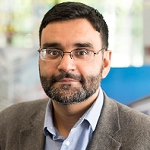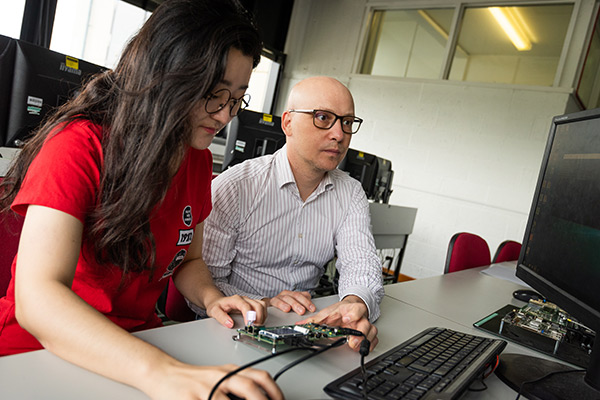
MSc Renewable Energy Technologies
Unlock a world of sustainable solutions and advance your career in the revolutionary renewable energy industry
Year of entry: 2026 (September)
Gain an interdisciplinary understanding of renewable energy in the fields of science and technology, industrial applications, and policy.
Bringing your passion for sustainable energies to laboratory-based tutorials and lecture-style activities, you'll gain the knowledge to make a positive impact in the world around us. You'll combine the technical and practical aspects of renewable energy technologies and policies and develop the skills necessary to design, analyse and optimize renewable energy systems.
Course content
Through theoretical and practical modules, you'll develop a sound understanding of the latest renewable energy technologies and their practical applications.
You'll learn about innovation, entrepreneurship, and project management through multiple modules of this programme.
You'll also complete a research project over the summer semester, gaining hands-on experience in planning, designing, and implementing renewable energy systems.
Modules
- Power Electronics
- Electric Vehicle Technologies
- Smart Grid
- Sustainable Energy Technologies: Solar, Wind, Geothermal and Marine
- Fuel Cell and Battery Technologies
- Critical Evaluation of Renewable Energy Systems
Our modules may change to reflect the latest academic thinking and expertise of our staff, and in line with Department/School academic planning.
Research project
The summer semester is dedicated to the "Renewable Energy Project" module, where you'll apply your knowledge and skills to a real-world renewable energy project.
During the project, you'll design and implement renewable energy solutions and apply your developed designs in practical settings at York Renewable Energy Laboratory.
Working closely with industry partners and academic experts, you'll foster valuable connections within the renewable energy field.
Learning outcomes
Every course at York is built on a distinctive set of learning outcomes. These will give you a clear understanding of what you will be able to accomplish at the end of the course and help you explain what you can offer employers. Our academics identify the knowledge, skills, and experiences you'll need upon graduation and then design the course to get you there.
Learning outcomes for this course
- Subject Knowledge: Providing an orientation program at the start of the program that covers the disciplinary knowledge and conventions of the discipline, as well as academic and writing skills and lab skills. This will provide students with the basic knowledge and skills necessary to succeed in the program.
- Engineering Analysis: Offering language support for non-native English speakers to ensure that all students have the necessary language skills to fully participate in the program. This could include offering English language classes or providing additional resources and support for students who need extra help with language skills.
- Engineering Design: Developing a mentoring program to pair students with more experienced students or faculty members who can provide guidance and support as they transition into the program.
- Practical Skills: Providing support for academic integrity, such as workshops on plagiarism and academic honesty, to ensure that all students understand the importance of maintaining academic integrity in their coursework.
- Technical Communication: Offering additional resources and support for students who need extra help with coursework, such as additional tutoring or office hours with instructors.
- Management and Personal Development: Encouraging students to actively participate in class, group projects, and other collaborative activities to help them develop the skills and knowledge necessary to succeed in the program.
Fees and funding
Annual tuition fees for 2026/27
| Study mode | UK (home) | International and EU |
|---|---|---|
| Full-time (1 year) | £13,900 | £32,900 |
Fees information
UK (home) or international fees? The level of fee that you will be asked to pay depends on whether you're classed as a UK (home) or international student. Check your fee status.
Find out more information about tuition fees and how to pay them.
Additional costs
All course text books and materials are available in the library or via the VLE. Depending on how you work, you may wish to pay for printing of notes and other material.
Funding information
Discover your funding options to help with tuition fees and living costs.
We'll confirm more funding opportunities for students joining us in 2026/27 throughout the year.
If you've successfully completed an undergraduate degree at York you could be eligible for a 10% Masters fee discount.
Funding opportunities
Chevening Scholarships
We are pleased to work with Chevening Scholars to offer funding for our Masters programmes. Chevening Scholarships provide one year of fully-funded postgraduate study in the UK for international (including EU) students. The scholarships are open to early and mid-career professionals who have the potential to become future leaders.
If available, subject-specific scholarship opportunities for our taught MSc courses will be advertised on the School funding information page.
Teaching and assessment
You’ll work with world‐leading academics who’ll challenge you to think independently and excel in all that you do. Our approach to teaching will provide you with the knowledge, opportunities, and support you need to grow and succeed in a global workplace.
Teaching format
We will teach you in a variety of formats. The course will include lectures by staff and industry experts who will provide an overview of the fundamental principles of renewable energy, including science and technology, industrial applications, and policy. We will provide tutorial sessions where you will work on problem-solving skills through exercises and case studies.
Our lab sessions will be based in the new developed Renewable Energy Laboratory which will provide you the opportunity to work with industry equipment and conduct experiments. From this, you will gain experience in designing, analysing, and optimising renewable energy systems. You'll also work in group projects, developing team work and applying your knowledge to problems the world is currently facing. You may also have the opportunity to complete internships or placements in industry or research settings, providing them with hands-on experience in the field and networking opportunities.
Facilities
You will have exclusive access to a designated space within the Bio Center building, featuring two newly developed laboratories: the Renewable Energy Lab and the Power Machines Lab. These labs are outfitted with electrical and electronics bench equipment, as well as a range of specialised testbeds for exploring renewable energy technologies.
Teaching location
The School of Physics and Engineering Technology is based on Campus West. The majority of teaching takes place within Campus West.
About our campus
Our beautiful green campus offers a student-friendly setting in which to live and study, within easy reach of the action in the city centre. It's easy to get around campus - everything is within walking or pedalling distance, or you can always use the fast and frequent bus service.
Assessment and feedback
You will be assessed through a mixture of written exams, laboratory reports, and a dissertation which is an independent research project on a topic of your choosing, relating to the subject.
Careers and skills
This course will equip you for a career in various fields within the renewable energy sector. You’ll develop strong skills in integrating diverse energy sources into grids, using expertise in power electronics, EV technology, and smart grids. You’ll also gain in-depth knowledge of solar, wind, geothermal, and marine energy technologies. This programme unlocks diverse career opportunities, including renewable energy consultant, energy system analyst, R&D specialist, and project manager for renewable energy initiatives. You'll foster invaluable industry connections and play a pivotal role in advancing global sustainability initiatives.
Career opportunities
- Renewable Energy Engineer
- Renewable Energy Consultant
- Energy Systems Analyst
- Energy Project Manager
- Energy Storage Engineer
- Energy Efficiency Engineer
- Electric Vehicle Engineer
- Renewable Energy Researcher
- Energy Policy Advisor
Transferable skills
- Problem-solving
- Designing innovative solutions
- Communication
- Teamwork
- Management
- Research
- Digital literacy
- Project management
- Presenting
Entry requirements
| Qualification | Typical offer |
|---|---|
| Undergraduate degree | 2:2 or equivalent in Electrical Engineering, Electronic Engineering, Computer Science/Mathematics joint honours, Mechanical Engineering or a relevant subject. We are willing to consider applications from students with lower qualifications, particularly if you have high marks in relevant modules or appropriate industrial experience. |
| Other international qualifications | Equivalent qualifications from your country |
English language
If English isn't your first language you may need to provide evidence of your English language ability. We accept the following qualifications:
| Qualification | Minimum requirement |
|---|---|
| IELTS (Academic and Indicator) | 6.0, minimum 5.5 in each component |
| Cambridge CEFR | B2 First: 169, with no less than 162 in each component |
| Oxford ELLT | 6, minimum of 5 in each component |
| Oxford Test of English Advanced | 126, minimum 116 in each component |
| Duolingo | 105, minimum 95 in all other components |
| LanguageCert SELT | B2 with 33/50 in each component |
| LanguageCert Academic | 65 with a minimum of 60 in each component |
| Kaplan Test of English Language | 444-477, with 410-443 in all other components |
| Skills for English | B2: Pass with Merit overall, with Pass in each component |
| PTE Academic | 55, minimum 51 in each component |
| TOEFL | 79, minimum of 17 in Listening, 18 in Reading, 20 in Speaking and 17 in Writing |
| Trinity ISE III | Pass in all components |
For more information see our postgraduate English language requirements.
If you haven't met our English language requirements
You may be eligible for one of our pre-sessional English language courses. These courses will provide you with the level of English needed to meet the conditions of your offer.
The length of course you need to take depends on your current English language test scores and how much you need to improve to reach our English language requirements.
After you've accepted your offer to study at York, we'll confirm which pre-sessional course you should apply to via You@York.
Next steps
Contact us
Get in touch if you have any questions

Dr Asim Mumtaz
Related courses
Discover York







